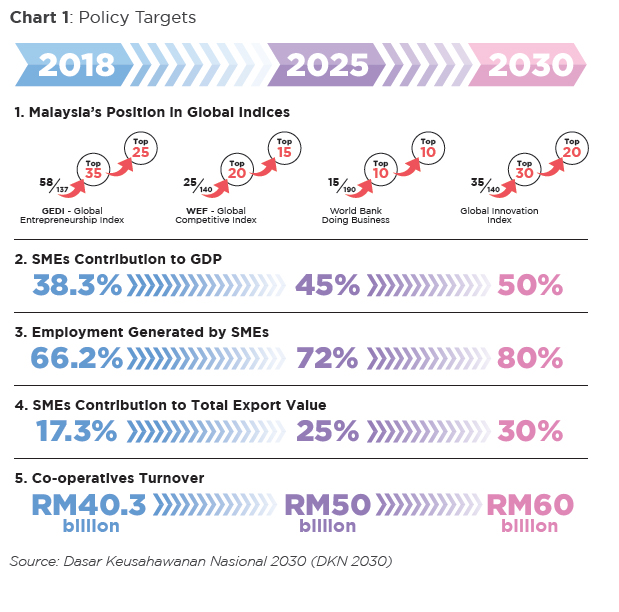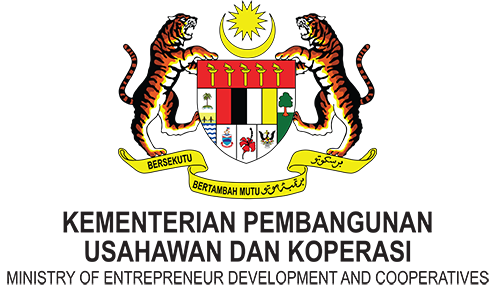DKN 2030 is designed to develop an entrepreneurial ecosystem in Malaysia that will enhance the country’s competitiveness in the global economy amidst increasing competition and challenges emerging from Industry 4.0 as well as creating an entrepreneurial culture in the Malaysian society.
The policy sets out five objectives, which are:

DKN 2030 highlights six strategic thrusts with the objective of transforming the Malaysian economy into one that is sustainable, inclusive, progressive and driven by knowledge and innovation.
Strategic Thrust 1
Fostering an Entrepreneurship Culture across all Segments of Malaysian Society
This strategic thrust aims at making creativity, innovation, risk-taking as well as the ability to act on opportunities arising as the basis to develop an entrepreneurial culture.
The two strategies adopted call for:
A1: Building of a critical mass of entrepreneurs
- Intensify entrepreneurship outreach and awareness programmes
- Raise awareness of entrepreneurship opportunities
- Leverage on the media to showcase the positive impact of entrepreneurship
- Give recognition to entrepreneurial role models
- Promote entrepreneurship as a career of choice
A2: Enhancement of entrepreneurship education and skills
- Embed the entrepreneurial culture in the education system
- Enhance the quality of entrepreneurship training
- Incorporate an apprenticeship programme in Technical and Vocational Education and Training (TVET)
- Provide structured entrepreneurial training
- Strengthen collaboration between industry and academia
Strategic Thrust 2
Optimising the Regulatory Environment and Access to Finance
The six strategies adopted to create an environment with agile and facilitative governance and market-friendly regulations and financing are:
B1: Promote good governance
- Enhance ICT-based procedures for business registration, reporting and monitoring
- Ensure procedures are applied in a uniform manner to avoid corrupt behavior, favouritism and nepotism
- Promote understanding and increase access of information on business procedures, laws and regulation to improve compliance
B2: Rationalise roles and functions of Entrepreneurship Development Organisations (EDOs)
- Streamline roles and functions of different EDOs for effective and optimum utilisation of resources
- Review various entrepreneurship programmes implemented by different EDOs
B3: Enhance monitoring and assessment of outcome and impact
- Establish a National Council entrepreneurship to evaluate and monitor result, impact and outcome as well as recommend action and policy enhancement
- Establish entrepreneurship big data and data analytics centre that can generate information on matters pertaining to entrepreneurship, such as programmes implemented, quantity and quality of entrepreneurs, gaps or opportunities, as well
as existing trends of entrepreneurship activities in the country
B4: Enhance and improve regulatory requirement for businesses
- Review and where appropriate, reduce existing regulatory requirement that negatively impact efficiency and ease of doing business
- Formulate facilitative regulations to unlock the economic values of new business sectors, such as air mobility, transportation and healthcare
- Balance regulations and standards with sustainable development objectives
- Lower the administrative overhead of incorporating and managing a business
- Encourage healthy competition by reducing barriers to entry for new business
B5: Reduce the bankruptcy stigma
- Introduce intervention programme to mitigate the risk of bankruptcy
- Facilitate re-starts by creating simple process to uplift status of the bankrupt
B6: Improve access to finance and financial inclusion for entrepreneurs and enterprises
- Provide easy access to alternative source of financing including venture capitals, angels investors and crowdfunding
- Improve access to relevant financial services including collateral-free loan
- Revitalise the role of Development Financial Institutions (DFIs)
- Facilitate access to information about holistic financing ecosystem for different target groups and business life cycle
Strategic Thrust 3
Promoting Holistic and Integrated Entrepreneurship Development
Three strategies have been drawn up to increase entrepreneurial opportunities for all levels of Malaysian society in order to enhance the socio-economic status of all concerned, namely:
C1: Support entrepreneurial endeavor of Bumiputera, disadvantaged & special focus groups
- Intensify outreach programme to disadvantaged group including low income households (B40), rural communities, differently-abled people
- Targeted assistance and intervention programmes to boost entrepreneurial capability and skills of Bumiputera, disadvantaged groups and special focus groups including women, youth, senior citizen and orang asli/asal community
- Create ‘incubation space’ in potential rural and economically depressed areas that is available to would-be/aspiring entrepreneurs
C2: Co-operatives as driver to inclusive socio-economic development
- Intensify co-operative movement towards low income households (B40) and rural communities, including promoting the establishment of community-based co-operatives
- Enhance capacity and capabilities of co-operatives in main economic sectors through a widen access to programmes, assistance and business opportunities at par with SMEs
- Transform the co-operative ecosystem landscape by undertaking a structural reform of agencies related to co-operatives and liberalising the regulatory framework for co-operatives
C3: Promote social entrepreneurship
- Instigate awareness and promote better understanding of social entrepreneurship through stronger community building
- Provide on-going support and capacity development programme for social entrepreneurs to expand their market and business opportunities as well as for scalability and sustainability of their enterprise
- Implement Inclusive Business (IB) model approach in the value chain of big companies, such as limited liability companies (LLCs) and multinational corporations (MNCs) to benefit microenterprises
Strategic Thrust 4
Accelerating Economic Growth through Innovation-Driven Enterprises
The two strategies and their complementary initiatives to enhance collaboration between entrepreneurs, innovators and researchers in the formation, development and growth of enterprises are:
D1: Support the high growth and innovation-driven enterprise
- Ramping up creation of high growth and innovative firms through targeted assistance in nine pillars of Industry 4.0 including automation, digitalisation and Artificial Intelligence (AI)
- Strengthen the national innovation ecosystem to enable potential start-ups towards future industries by creating an entrepreneurial cluster and building up the capacity of financial sector to meet the specific needs of innovation-driven and high-tech start-ups
- Provide performance-based loans and incentives for innovation including the use of Intellectual Properties (IPs) as collateral
D2: Facilitate technology exchange and innovation
- Enable R&D uptake and research collaboration between industry/SMEs and academia/research institutions
- Build networks in knowledge-intensive sectors with leading technology and science experts and academics around the world
- Develop market friendly university-industry collaboration to diffuse innovation
Strategic Thrust 5
Boosting the Entrepreneurial Capabilities and Performance of MSMEs
This strategic thrust aims at elevating MSMEs through value adding as well as the diversification of process, products and services. The four strategies adopted are:
E1: Strengthen the implementation of vendor development programme
- Increase participation of new anchors from Government-linked companies (GLCs), MNCs, public-listed companies (PLCs), vendor champions and private companies
- Create multiple-tiers among Bumiputera vendor
- Expand key potential areas from high-growth industry sector, such as aerospace, automotive, rail, renewable energy, medical devices, biotechnology and halal industry
E2: Enhance entrepreneurship skills and capabilities of MSMEs
- Provision of training and development programmes related to Industry 4.0, strategic management, certification, marketing and branding, packaging, product development and e-commerce
- Targeted support and facilitation for MSMEs to venture into new and high potential sectors
- Enhance capacity building programme that emphasise on competitive mindset and internationalisation strategy
- Provide financial literacy programme particularly for micro and small enterprises
E3: Provision of targeted support for market access especially for Bumiputera MSMEs
- Provide access to various e-commerce platforms for MSMEs to promote and market their products
- Intensify product access for MSMEs into wholesales and retail outlets
- Leverage on Government procurement to prioritise on local products and services
- Facilitate regulatory compliance, certification and accreditation for MSMEs
- Intensify promotion of local products and services at strategic locations and entry points
E4: Strengthen supply chain management
- Break down monopoly in certain industries through intervention programmes
- Improve logistics, physical and digital infrastructures of businesses through public-private partnership
Strategic Thrust 6
Internationalisation of High-Growth Enterprises
This strategic thrust aims at creating strategic partnerships and alliances between local and international companies as well as compliance with global standards and quality. Towards this end, two strategies have been adopted, namely:
F1: Facilitate access for local enterprise especially Bumiputera to international market
- Provision of market intelligence and advisory services on international market
- Create an international alternative financing network to support local entrepreneurs who want to venture into international market
- Facilitate compliance of international standard
F2: Promote networking and business collaboration
- Escalate Government-to-Government (G2G) partnership as well as multilateral and bilateral collaboration among local SMEs with APEC and ASEAN member states to address trade barrier and create synergies
- Stimulate private sector-led initiatives through industry chambers and organisations
























